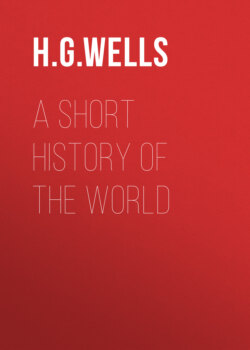Читать книгу A Short History of the World - H. G. Wells - Страница 66
На сайте Литреса книга снята с продажи.
PRIMITIVE THOUGHT
ОглавлениеAND now let us indulge in a very interesting speculation; how did it feel to be a man in those early days of the human adventure? How did men think and what did they think in those remote days of hunting and wandering four hundred centuries ago before seed time and harvest began. Those were days long before the written record of any human impressions, and we are left almost entirely to inference and guesswork in our answers to these questions.
The sources to which scientific men have gone in their attempts to reconstruct that primitive mentality are very various. Recently the science of psycho-analysis, which analyzes the way in which the egotistic and passionate impulses of the child are restrained, suppressed, modified or overlaid, to adapt them to the needs of social life, seems to have thrown a considerable amount of light upon the history of primitive society; and another fruitful source of suggestion has been the study of the ideas and customs of such contemporary savages as still survive. Again there is a sort of mental fossilization which we find in folk-lore and the deep-lying irrational superstitions and prejudices that still survive among modern civilized people. And finally we have in the increasingly numerous pictures, statues, carvings, symbols and the like, as we draw near to our own time, clearer and clearer indications of what man found interesting and worthy of record and representation.
Primitive man probably thought very much as a child thinks, that is to say in a series of imaginative pictures. He conjured up images or images presented themselves to his mind, and he acted in accordance with the emotions they aroused. So a child or an uneducated person does to-day. Systematic thinking is apparently a comparatively late development in human experience; it has not played any great part in human life until within the last three thousand years. And even to-day those who really control and order their thoughts are but a small minority of mankind. Most of the world still lives by imagination and passion.
Probably the earliest human societies, in the opening stages of the true human story, were small family groups. Just as the flocks and herds of the earlier mammals arose out of families which remained together and multiplied, so probably did the earliest tribes. But before this could happen a certain restraint upon the primitive egotisms of the individual had to be established. The fear of the father and respect for the mother had to be extended into adult life, and the natural jealousy of the old man of the group for the younger males as they grew up had to be mitigated. The mother on the other hand was the natural adviser and protector of the young. Human social life grew up out of the reaction between the crude instinct of the young to go off and pair by themselves as they grew up, on the one hand, and the dangers and disadvantages of separation on the other. An anthropological writer of great genius, J. J. Atkinson, in his Primal Law, has shown how much of the customary law of savages, the Tabus, that are so remarkable a fact in tribal life, can be ascribed to such a mental adjustment of the needs of the primitive human animal to a developing social life, and the later work of the psycho- analysts has done much to confirm his interpretation of these possibilities.
Some speculative writers would have us believe that respect and fear of the Old Man and the emotional reaction of the primitive savage to older protective women, exaggerated in dreams and enriched by fanciful mental play, played a large part in the beginnings of primitive religion and in the conception of gods and goddesses. Associated with this respect for powerful or helpful personalities was a dread and exaltation of such personages after their deaths, due to their reappearance in dreams. It was easy to believe they were not truly dead but only fantastically transferred to a remoteness of greater power.
The dreams, imaginations and fears of a child are far more vivid and real than those of a modern adult, and primitive man was always something of a child. He was nearer to the animals also, and he could suppose them to have motives and reactions like his own. He could imagine animal helpers, animal enemies, animal gods. One needs to have been an imaginative child oneself to realize again how important, significant, portentous or friendly, strangely shaped rocks, lumps of wood, exceptional trees or the like may have appeared to the men of the Old Stone Age, and how dream and fancy would create stories and legends about such things that would become credible as they told them. Some of these stories would be good enough to remember and tell again. The women would tell them to the children and so establish a tradition. To this day most imaginative children invent long stories in which some favourite doll or animal or some fantastic semi-human being figures as the hero, and primitive man probably did the same—with a much stronger disposition to believe his hero real.
